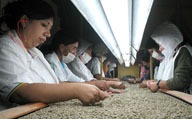
Leveraging Public-Private Partnerships To Increase Coffee Growers’ Incomes
The USAID Specialty Coffee Program in Colombia assisted over 30,000 farmers to participate in the growing sp ecialty coffee niche and, in turn, increase their household incomes by an average of 17 percent. The Program, implemented by ACDI/VOCA, contributed to the rapid growth in the number of bags of specialty coffee exported by Colombia from 220,000 in 2006 to over 2,000,000 as of March 2012. The Program (implemented from October 2007 to April 2012) built upon the success of the previous Specialty Coffee Program (2002-2007) and continued to consolidate the achievements made in providing viable licit economic alternatives to rural families.
ACDI/VOCA employed a value chain approach focused upon sustainably improving the competitiveness and marketability of Colombian specialty coffee in the global market. The Program focused on supporting the strengthening of six elements covering the entire specialty coffee value chain continuum from farm to end consumer including: renovation of coffee plantations; on-farm processing infrastructure; quality improvement; technical assistance in coffee production and appropriate environmental practices; institutional strengthening and training for producer groups and their staffs; and, commercialization and marketing.
Over the life of the project, a total of 30,583 Colombian families learned and applied Best Agricultural Practices for specialty coffee production on their farms; 175 buying points were strengthened to better handle growing volumes of specialty coffee; 14 strategic alliances were formed with public and private sector partners to speed the roll out of specialty coffee production techniques while improving the commercialization of these niche products.
To achieve these results, ACDI/VOCA worked closely with a wide range of strategic partners, each of whom contributed knowledge and technical innovation that strengthened the Colombian coffee sector. The Program also built alliances with the Federación Nacional de Cafeteros (FNC), Servicio Nacional de Aprendizaje (SENA), decentralized coffee growers committees and cooperatives and producers associations. The Government of Colombia’s Departamento para la Prosperidad Social (DPS – formerly Acción Social), through several agreements with ACDI/VOCA also provided cash, technical resources and official guidance (as the official entity responsible for the fight against illicit crops) to the coffee sector. In addition, the program incorporated Global Development Alliance (GDA) partners including the Specialty Coffee Association of America (SCAA), the Coffee Quality Institute (CQI), Nespresso and its AAA Sustainable Quality Program, Sustainable Harvest (SH) and Rain Forest Alliance-Fundacion Natura, which provided matching resources as well as commercial and technical guidance.
Through these various alliances, the program was able to leverage over $10 million dollars, which enabled the Program to reach a greater number of beneficiaries and to geographically expand the areas of assistance. This included working in the Sierra Nevada de Santa Marta region, providing assistance to several indigenous farmer groups as well as Returnees, who had been internally displaced due to armed conflict in the region.





